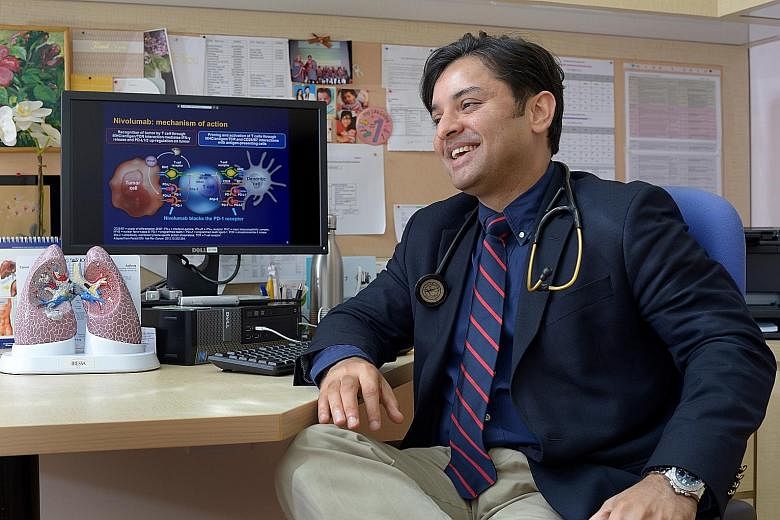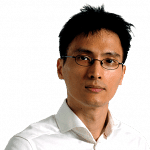His father flew supersonic MiG-21 jets with the Indian Air Force, and he almost became a fighter pilot himself.
Instead, Dr Akhil Chopra embarked on a path to save the lives of people suffering from cancer, constantly pushing the boundaries of medical knowledge just as a fighter pilot pushes the limits of his plane.
Dr Chopra, 40, is a senior consultant in oncology at Johns Hopkins Singapore International Medical Centre at Tan Tock Seng Hospital (TTSH), which conducts research and offers treatments for a variety of cancers.
He is an expert in immunotherapy, an emerging approach to cancer treatment that "releases the brakes" of the body's own immune system to attack the cancer.
The drugs that activate the immune system in this way are proteins called antibodies, which are already present in the body but in small quantities.
This makes immunotherapy a "most natural way of treating anything whether it's an infection or a cancer", said Dr Chopra. It has much less severe side effects than chemotherapy, which "poisons" cells' DNA.
"It has given so many more options to our patients - that is what I want as a doctor."
The centre of attention in Dr Chopra's research is Nivolumab, an immunotherapy drug that has been approved for use in Singapore for lung and skin cancer and is undergoing clinical trials for liver cancer.
Dr Chopra is excited to be a part of the first team here to enrol patients in the clinical trials of this cutting-edge medication.
"There's a big unmet need. There is no good treatment that exists for liver cancer outside of Sorafenib (a chemotherapeutic drug)."
Born in Jammu in India's far north, he had a nomadic childhood because of his father's military tours of duty across India, living in many places before finally settling down in New Delhi for college.
This placed significant stress on him as a student because different states had very different cultures, and he had to adjust to different education systems.
But the experience gave Dr Chopra the adaptability to explore.
After completing medical school in 2001, he "never thought for a second" about voyaging alone to the United States with a single suitcase to be a doctor at the local hospital in the small town of Reading in Pennsylvania.
Despite the allure of military aviation, Dr Chopra chose medicine. He felt the long-term career prospects were more stable than those of a fighter pilot, and medicine would give him more opportunities to see the world.
By the time he arrived in the US, he had a clear goal of becoming a cancer specialist.
"It intrigued me, it excited me, and it gave me a challenge."
He was about to face one of the greatest challenges of his life.
The healthcare system in the US was considerably more sophisticated than India's, and he faced an uphill task catching up with the latest technology and with his American peers.
On top of that, patients in the US were more demanding as they were more aware of medical issues.
In his first year there, he was close to quitting and going back to India. But his superior told him to press on. In 2005, he was awarded a medical fellowship in Philadelphia.
Four years later, he was in Singapore visiting his sister when he chanced upon an advertisement for a job opening at TTSH.
Inspired by the "big vibrant hospital" and "blown away" by Singapore, he decided it was the best choice both professionally and personally.
"The rest is history," he said.
Dr Chopra said his work carries a heavy emotional burden although it is also highly rewarding.
"We are not an orthopaedic surgeon that fixes the knee and goes back, and never sees the patient again.
"We travel the journey of the patient's life and eventual demise if that happens... We stay with them till the end."
When the outcome is bad, Dr Chopra's passion for aviation is a source of consolation.
When off duty, he keeps up with the latest technological advancements in fighter jets and attends air shows. His favourite planes are the futuristic stealth fighters F-22 Raptor and Sukhoi PAK FA.
He said that his family and having a hobby outside of medicine help him maintain a balanced perspective on life.
Dr Chopra also has many people to thank for the headway he has made in the fight against cancer.
As the programme director of the hospital's oncology training programme, he treasures his interaction with junior doctors.
"When I interact with my juniors, sometimes they have good ideas... and that spurs me on.
"It's the constant interaction with your colleagues, your juniors, your trainees that helps keep the spark alive."
Dr Chopra highlighted another group of people: "Without the patients, there can be no trials. So you have to give credit to the patients for trusting their physicians to make the right decision for them."
Correction Note: This article has been edited for clarity.


